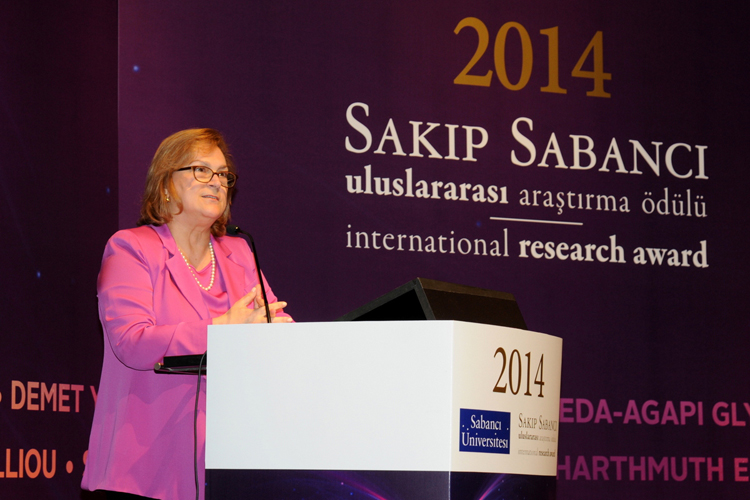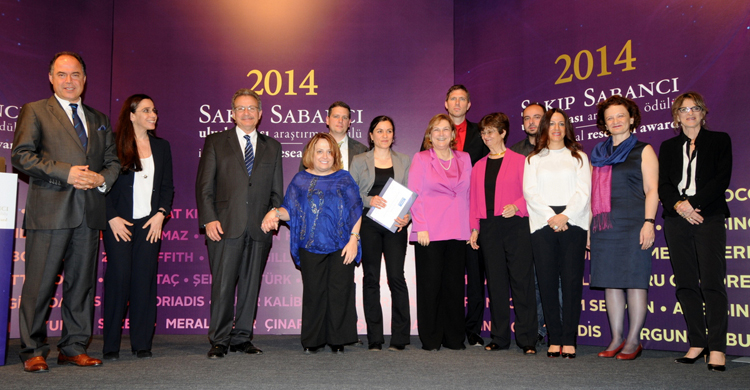27/05/2014
Sakıp Sabancı International Research Awards were given for Gender Equality in Turkey
Sabancı University Board of Trustees Chair Güler Sabancı:
“Gender equality is an important indicator of the level of development in a country.”

“According to World Economic Forum's Global Gender Gap Report in 2013, Turkey ranked 120th among 136 countries. Only 30% of women in Turkey participate in the workforce compared to 76% of men. This shows how great the gender gap in Turkey is.”
Established by Sabancı University, the 9th “Sakıp Sabancı International Research Awards” were presented at a ceremony hosted by Board of Trustees Chair Güler Sabancı and President A. Nihat Berker at the Sabancı University Sakıp Sabancı Museum the Seed.
After the introductory remarks of Sabancı University Board of Trustees Chair Güler Sabancı, Jury Panel Chair Professor Sibel Irzık from the Sabancı University Gender and Women’s Studies Forum explained the reasoning for the Jury Prize, followed by Professor Fuat Keyman, Director of the Sabancı University Istanbul Policy Center, explaining the reasoning for the Essay Awards presented to young researchers.

The recipients of the three equally-weighted Essay Awards were:
• “Beyond Numbers: Rethinking the Education and Empowerment of Girls in Turkey” by Akanksha Misra (University of Washington),
• “Properties of Modern Women and the Negotiation of Gender Norms within Space” by Emine Gökçen Yüksel (Universität der Bundeswehr Munich), Stephan Stetter (Universität der Bundeswehr Munich) and Jochen Walter (Universität Bielefeld)
• “Questioning Calculations of Justice: Criminal Law, Hate Crimes and Queer Approaches” by Aslı Zengin (University of Toronto).
Deniz Kandiyoti received her award from Sabancı University Board of Trustees Chair Güler Sabancı and President Nihat Berker. Essay Award winners received their prizes from the late Sakıp Sabancı’s daughter and Sabancı University Board of Trustees Member Sevil Sabancı.
“In the current state of affairs, I believe it is imperative that we view gender equality outside of traditional norms, and utilize a scientific approach to the subject.”
Güler Sabancı said, “In the current state of affairs, I believe it is imperative that we view gender equality outside of traditional norms, and utilize a scientific approach to the subject. Improvements in the legal system are being made on the one hand. There are declarations of universal values of equality and objectives established to this purpose. Yet, we have to make more effort in order to ensure that this issue is appreciated in our daily lives.”
“Gender equality is an important indicator of the level of development in a country”
Güler Sabancı said, “Gender equality is an important indicator of the level of development in a country. According to World Economic Forum's Global Gender Gap Report in 2013, Turkey ranked 120th among 136 countries. Only 30% of women in Turkey participate in the workforce compared to 76% of men,” and emphasized how great the gender gap in Turkey was as shown by these figures.
“Gender equality is an issue that the entire society must embrace.”
Arguing that women’s education opportunities must be improved and economic positions must be strengthened to change the current outlook, Güler Sabancı said “We must ensure the active participation of women in politics and prevent violence towards women. We need to understand each other more in gender equality studies, and work towards a common goal. Gender equality is an issue that the entire society must embrace. As Sabancı University, this was what we had in mind when choosing the theme for the 2014 Sakıp Sabancı Research Awards. We wanted to encourage young researchers in particular to work for gender equality in Turkey.”
Güler Sabancı concluded her speech by thanking esteemed academics who have led the society onwards with their lifelong efforts, young academics making submissions to the awards, and the members of the international jury headed by Sabancı University faculty member Sibel Irzık.
“The patriarchal is a crumbling structure that has difficulties in re-producing itself.”
Deniz Kandiyoti, this year’s winner of the Jury Prize, said that at one point in history, slave trade was widespread and scientific theories, religious and creationist rationale were used to legitimize this practice. Kandiyoti remarked that people were still being traded today, although most of them were women and children, and similar scientific, religious and creationist arguments were still being used to make the issue seem legitimate. Saying that she viewed gender issues like a puzzle that needs solving, Kandiyoti argued that under the 21st century conditions, the patriarchal is a crumbling structure that has difficulties in re-producing itself. Deniz Kandiyoti concluded, “The patriarchal is being resurrected as an administrative science. But the new generation rises up against subservience and obedience. The new generation will lead us to emancipation.”

This year’s jury consisted of Sibel Irzık (Sabancı University – Gender and Women’s Studies Forum), Ayşe Kadıoğlu (Sabancı University), Fuat Keyman (Sabancı University – Istanbul Policy Center), Cemal Kafadar (Harvard University) and Isabelle de Courtivron (Massachusetts Intitute of Technology).
About Deniz Kandiyoti
Born in Istanbul, Turkey, Kandiyoti received a Bachelor of Arts from University of Paris in 1966 and a Master of Science in Social Psychology from the London School of Economics before receiving her PhD there as well. Kandiyoti’s academic life has been based in theoretical as well as field-based studies. From 1969 until 1980, Kandiyoti worked at Istanbul Technical University and Boğaziçi University in Turkey, but then moved to England to teach at Richmond College in Surrey, England. Kandiyoti was a fellow at University of Manchester and the University of Sussex from 1987-1988. In 1988, she coined the term patriarchal bargain, describing a tactic in which a woman chooses to accommodate and accept gender roles that disadvantage women overall but maximize her individual power and options. From 2000-2005, Kandiyoti was part of a research effort sponsored by United Nations Research Institute For Social Development (UNRISD). She is also the editor of the journal Central Asian Survey, “the only established peer reviewed, multi-disciplinary journal in the world concerned with the history, politics, cultures, religions and economies of the Central Asian and Caucasian regions.”





